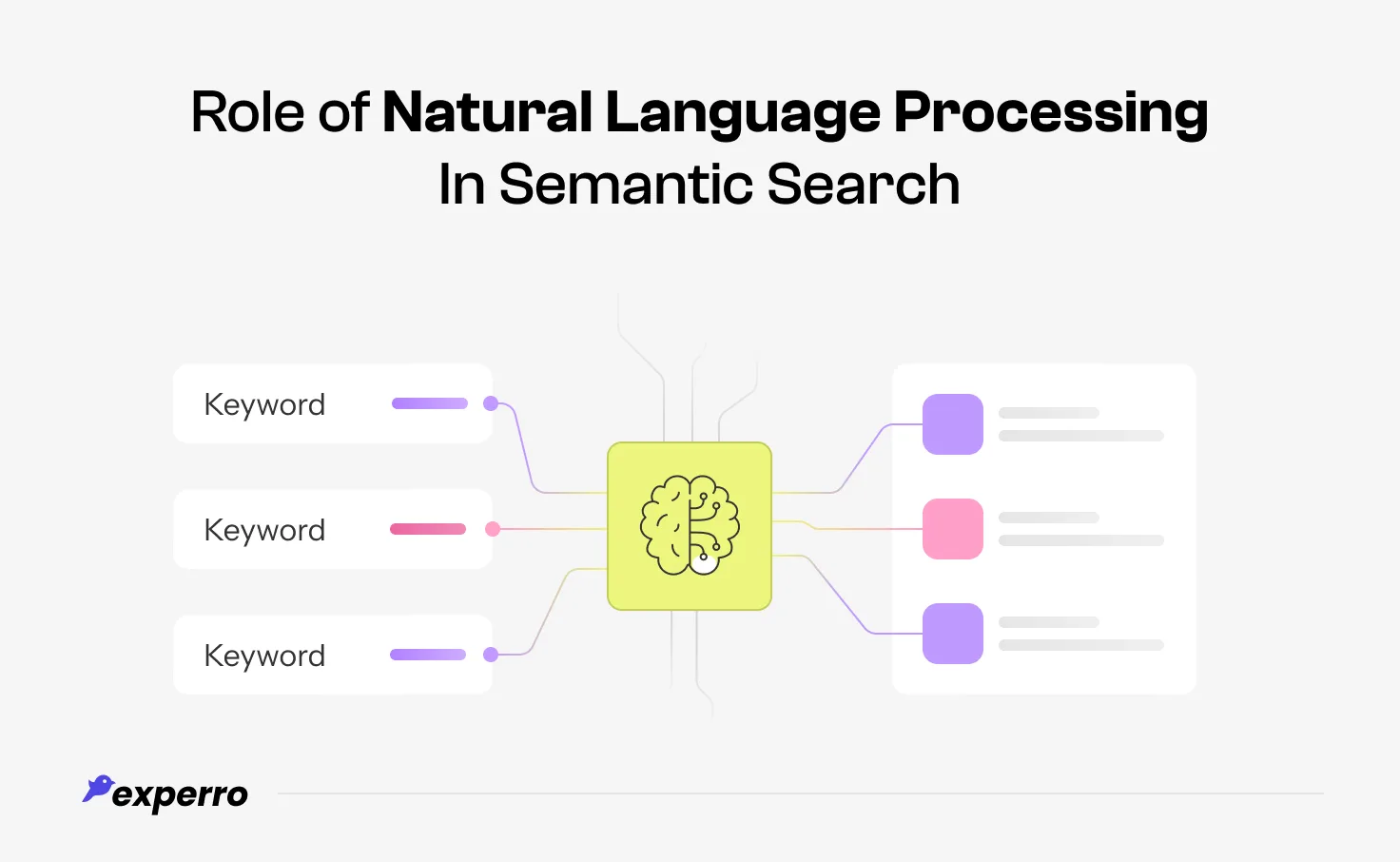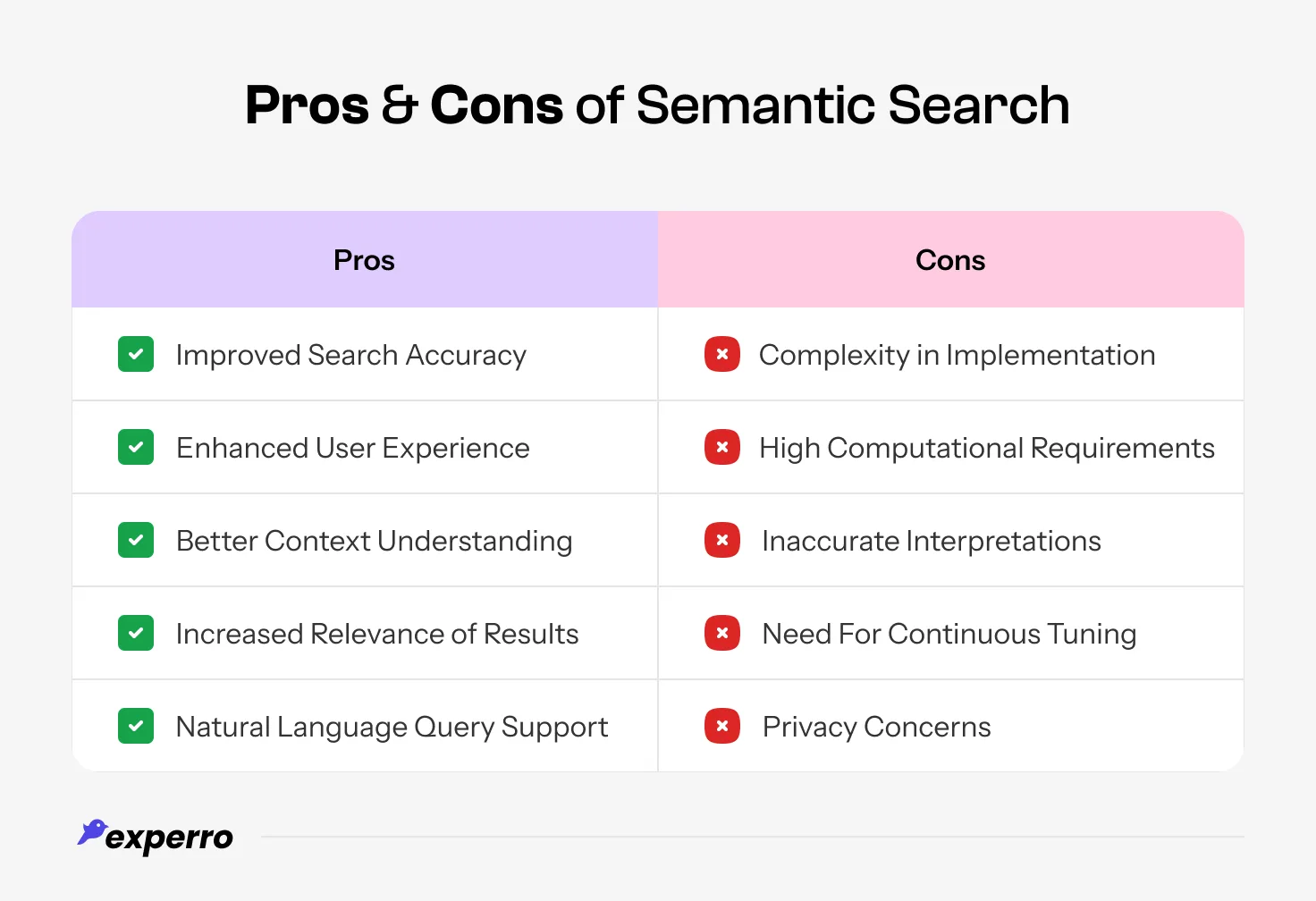core insights box
- Understanding what semantic search is helps you deliver smarter, more accurate results that directly improve user satisfaction and on-site engagement.
- Conceptual and semantic search technologies enable more personalized, efficient, and intuitive search experiences.
- Implementing semantic search in ecommerce improves product relevance, reduces zero-result pages, and lifts conversion rates and customer loyalty.
- Experro’s AI-powered semantic search engine enhances product discovery and merchandising by placing the most meaningful items in front of each shopper.
Ever wondered how some eCommerce sites predict customer searches so accurately? That's the power of semantic search.
Semantic search goes beyond the basic keyword matching. It, in fact, does more than that!
It understands the context and provides the user with something that matches his search.
In eCommerce, meaning-based search helps customers find what they are looking for faster. It can interpret complex semantic search queries, understand synonyms, and even rectify spelling errors.
This leads to a more personalized and efficient shopping experience, boosting customer satisfaction and engagement.
As a result, semantic search is quickly becoming a must-have feature for leading eCommerce platforms.
Now, let’s learn more about semantic search definition.
What Is Semantic Search In eCommerce?

Semantic Search meaning - Semantic search is a search method that uses NLP and machine learning to understand the meaning and intent behind a query, delivering relevant results even when exact keywords aren’t used.
In eCommerce, semantic search enhances the shopping experience by interpreting the meaning behind search queries rather than just search terms.
It utilizes technologies like NLP and AI to achieve this. Semantic search engines can understand synonyms, context, and user intent, offering more precise and useful search results.
For example, semantic search technology can link terms like "running shoes" and "jogging sneakers," recognizing them as related items.
eCommerce sites with semantic search see a lower abandonment rate as compared to non-semantic search sites.
This approach improves customer satisfaction by providing relevant results quickly and increases conversion rates.
After understanding what is meant by semantic search, let’s understand why it matters now.
Why Does Semantic Search Matter for Your Users?
Semantic search helps users feel understood. Instead of forcing exact-match keywords, semantic site search interprets intent, context, and attributes so shoppers quickly reach the right products or answers.
It handles natural language, typos, vague phrases, and multi-layer queries — delivering relevant results even when users search with incomplete or imprecise terms. This leads to faster discovery, smoother journeys, and fewer abandoned searches.
For commerce and B2B buyers, a semantic-based search engine highlights products that fit their needs, preferences, and past behavior. This improves product visibility, supports personalisation, and increases the chances of higher AOV and more conversions.
In short, semantic search technologies create an intuitive, human-like experience where users find what they want without effort, making every visit more satisfying and more valuable for the business.
The next section will help you understand how semantic search works.
How Does Semantic Search Work?

Intent understanding - Semantic search uses NLP to interpret the meaning and intent behind a query, allowing the engine to understand what the user actually wants instead of relying on exact keywords.
Contextual analysis - It analyzes relationships between words, synonyms, attributes, and sentence structure, enabling more accurate and meaningful results across ecommerce and B2B searches.
Vector embeddings - Queries and catalog data are converted into vector representations. The semantic engine identifies the closest matches in multi-dimensional space, improving relevance for broad, vague, or conversational searches.
Machine learning - ML models refine results by learning from user behaviour, past interactions, and product relationships, making semantic searches increasingly precise over time.
Hybrid search - Many semantic search technologies combine vector search with traditional keyword search, ensuring the best of both worlds for ecommerce sites, marketplaces, and enterprise search systems.
In the next section, let us walk you through the role of NLP in semantic search engine.
Role of Natural Language Processing in Semantic Search Engine

Natural Language Processing (NLP) plays a crucial role in enhancing contextual search capabilities. The market size of AI in NLP will go up by $38.3 billion between 2024 and 2029!
By understanding the nuances of human language, NLP enables semantic and vector search to interpret the context and intent behind user queries. This leads to more accurate and relevant search results.
Unlike traditional lexical search, which relies on exact keyword matches, semantic search uses NLP to grasp the meaning of words and phrases. This makes it more effective in handling complex queries.
With advanced semantic search for shopping, eCommerce sites can now offer hyper-personalization and efficient searches.
The integration of NLP in semantic search systems is essential for achieving these benefits, making it a key component of modern semantic search platforms.
What Are the Pros & Cons of Semantic Search?
Enterprise semantic search engines bring numerous benefits and challenges for both customers and entrepreneurs. Understanding these cons and the benefits of semantic search is crucial for leveraging this technology effectively.

Here's a breakdown of the importance of semantic search and how it impacts both groups.
Pros of Semantic Search for the Customers & Entrepreneurs
We have explained the advantages of Gen AI-powered semantic search. Here you go:
1. Improved Search Accuracy
For customers: This is one of the main benefits of optimizing for semantic search. It helps customers to find products or information quickly and efficiently, improving the balance between product search vs discovery and reducing frustration. This leads to a smoother and more enjoyable shopping experience.
For entrepreneurs: Increase the sales and customer satisfaction with precise search results, leading to better retention. Accurate searches will reduce bounce rates and boost your conversion rates, driving business growth.
2. Enhanced User Experience
For customers: An intuitive and seamless browsing experience makes shopping more enjoyable. With a user-friendly interface and multimodal search capabilities, they can find products effortlessly through text, image, or voice, keeping them engaged and exploring longer.
For entrepreneurs: Benefits entrepreneurs with higher engagement and retention rates, as a smooth experience keeps users coming back. Positive experiences lead to word-of-mouth referrals and brand loyalty.
3. Better Context Understanding
For customers: Customers receive contextually relevant keyword search results that match their search intent through predictive customer analytics, improving satisfaction. This ensures that users find exactly what they're looking for without unnecessary effort.
For entrepreneurs: Entrepreneurs gain deeper insights into customer behavior and preferences, enabling more targeted marketing. This data can inform product development and inventory management.
4. Increased Relevance of Results
For customers: With predictive search, customers receive tailored search results that match their needs, making it easier to find desired products. This reduces the time spent searching and increases the likelihood of making a purchase.
For entrepreneurs: Experience improved conversion rates and customer satisfaction, as relevant results drive sales to your business. Tailored search results can also increase average order value.
5. Support for Natural Language Queries
For customers: Semantic search provides natural language for customers eCommerce search to find what they need easily, enhancing the search experience. This makes the search process more natural and more enjoyable.
For entrepreneurs: Entrepreneurs cater to a broader audience with various query formats, increasing market reach and accessibility. Supporting natural language search queries can attract a more diverse customer base.
Cons of Semantic Search for Customers & Entrepreneurs
Here are the minor downsides:
1. Complexity in Implementation
For customers: Intent-based search may cause initial issues or glitches during the transition, affecting the user experience. These initial problems can lead to temporary dissatisfaction and reduced usage.
For entrepreneurs: Entrepreneurs face challenges in integrating and maintaining complex systems, which can be time-consuming and costly. This complexity may require hiring specialized staff or consultants.
2. High Computational Requirements
For customers: Could experience slower performance if systems aren't optimized, leading to frustration. Slow load times can deter customers and lead to abandoned searches.
For entrepreneurs: Bear the cost of additional resources and infrastructure, impacting the budget and operational efficiency. High computational needs can impact existing IT resources and require upgrades.
3. Potential for Inaccurate Interpretations
For customers: May see occasional mismatches in search results, causing dissatisfaction. Inaccurate results can lead to frustration and a lack of trust in the search functionality.
For entrepreneurs: Must address the impact of inaccuracies on user trust, which can harm the brand's reputation. Ensuring accuracy may require constant monitoring and adjustments.
4. Need for Continuous Tuning and Updates
For customers: Experience disruptions from frequent updates and adjustments, which can be inconvenient. Regular changes can confuse users if not communicated effectively.
For entrepreneurs: Continuously invest time and resources in system maintenance, ensuring the search remains effective. Ongoing updates can be costly and resource-intensive.
5. Privacy Concerns
For customers: Customers generally get worried about how their data is used and protected, which can affect their trust in the platform. Concerns about data security can discourage them from using semantic search as a service.
For entrepreneurs: Ensure consent management and data protection. It is necessary to comply with privacy regulations, requiring compliance efforts. Failing to protect customer data can lead to legal issues and loss of reputation.
These were the pros and cons of semantic product search algorithm.
Smarter search starts with Experro...
Stop losing customers to irrelevant results. Upgrade to semantic search.
What Are the Examples of Semantic Search in eCommerce?
Semantic search technology is transforming how users interact with search engines with eCommerce search intelligence that understands the intent behind queries.
This means semantic search in eCommerce functions whenever the search engine understands the meaning behind what shoppers type and returns products that match their intent.
Common examples include:
Problem-based queries:
Searches like “chair for back pain,” “dress for beach wedding” or “shoes for flat feet” return relevant products even without direct keyword matches.Attribute-driven searches:
Queries such as “red cotton kurta”, “waterproof hiking jacket” or “round wooden dining table” combine multiple attributes that semantic search interprets correctly.Compatibility and use-case queries:
Example: “charger for iPhone 14,” “filter for Samsung vacuum” or “accessories for DSLR cameras”.Natural language queries:
“Show me budget laptops under $800”, “gifts for new parents” or “office wear for winter.”Synonym and variation handling:
Searches like “sofa vs. couch,” “sneakers vs. trainers” or “kids’ pyjamas vs. nightwear” return consistent results due to semantic understanding.Contextual typo correction:
Even with errors like “runing shos” or “blak dres”, semantic engines still deliver relevant results by interpreting user intent.
These examples show how semantic ecommerce search improves discovery, reduces friction, and connects shoppers to products that truly match what they meant — not just what they typed.
By understanding ontology-driven search and how it works in these examples, we can see its significant impact on enhancing search capabilities and user experiences.
Want to test how relevant is your 'search experience'?
Use this checklist to guage how good is your semantic search experience.
Experro's Semantic Search Understands Your Customers' Search Intent Deeply...
Experro is a platform that provides eCommerce search intelligence and merchandising capabilities, aligning perfectly with semantic search.
Our hero feature Gen AI-powered search understands the context and intent behind user queries, delivering appropriate results.
This means customers find what they're looking for faster, improving satisfaction and conversion rates. The platform utilizes semantic search in AI to interpret complex queries, enhancing user experience.
Why is Gen AI-powered semantic search worth it?
Let us help you tap into the untapped opportunities with semantic search demo for your e-store!
Conclusion
In conclusion, integrating contextual semantic search into your eCommerce platform offers numerous benefits.
By staying ahead with cutting-edge technology, you can ensure your eCommerce search remains competitive and thrives in the digital marketplace.
We hope that this semantic search guide has helped you to understand the concept. Stay tuned to learn more or schedule a call to connect with our experts regarding search optimization.
FAQs
What are the principles of semantic search?
The principles of semantic search include:
- understanding context
- interpreting intent
- identifying relationships between concepts
- using NLP and ML to enhance search accuracy and relevance.
How is semantic search different from lexical search?
Semantic search interprets the meaning and context behind queries, while lexical search relies on exact keyword search matches. Intelligent search provides more accurate results by understanding intent.
For example, a semantic search for "best running shoes for flat feet" understands the user's need for specific shoe features. However, a lexical search would simply match documents containing those exact keywords.
Does Google use semantic search?
Yes, Google uses semantic search to understand user intent and contextual meaning of search queries, providing more accurate results.
Why do eCommerce sites need semantic search engines?
eCommerce sites need semantic search engines to enhance search accuracy and improve user experience.
This helps increase conversion rates and reduce cart abandonment by effectively understanding and addressing customer intent.
What are the differences between semantic search vs vector search?
Semantic search focuses on understanding the context and intent behind user queries to provide relevant results.
Vector search, on the other hand, uses multi-dimensional points to represent and retrieve data based on similarity, allowing for more precise and efficient searches in large datasets.
How does semantic search benefit my business?
Semantic search benefits your business by improving how customers discover products, content, and answers. Instead of relying on exact keywords, semantic search technologies understand intent, context, and attributes. This leads to more accurate results, higher engagement, and stronger conversion rates.
Businesses also see fewer zero-result searches, better product visibility, and increased revenue per visitor. In B2B environments, semantic-based search engines help buyers navigate complex catalogs, reduce search friction, and make faster, more confident decisions. The result is a smoother user journey and a measurable lift in sales and customer satisfaction.
Why do ecommerce sites and marketplaces need semantic search engines?
Ecommerce sites and marketplaces need semantic search engines because shoppers now use natural language, descriptive phrases, and problem-based queries rather than exact keywords. Traditional search cannot interpret this behaviour, which leads to irrelevant results and lost revenue.
A semantic ecommerce search engine understands meaning behind queries, handles typos, recognises product attributes, and interprets multi-intent phrases. This improves product discovery, increases conversions, and reduces abandonment. For large marketplaces, enterprise semantic search engines ensure consistent relevance across thousands of SKUs and brands, helping users find the right product quickly and increasing overall marketplace efficiency.
Pallavi Dadhich
Content Writer @ ExperroPallavi is an ambitious author recognized for her expertise in crafting compelling content across various domains. Beyond her professional pursuits, Pallavi is deeply passionate about continuous learning, often immersing herself in the latest industry trends. When not weaving words, she dedicates her time to mastering graphic design.
What's Inside
- What Is Semantic Search In eCommerce?
- Why Does Semantic Search Matter for Your Users?
- How Does Semantic Search Work?
- Role of Natural Language Processing in Semantic Search Engine
- What Are the Pros & Cons of Semantic Search?
- What Are the Examples of Semantic Search in eCommerce?
- Experro's Semantic Search Understands Your Customers' Search Intent Deeply...
- Conclusion
Subscribe to Our Newsletters
Get the latest insights delivered straight to your inbox.



